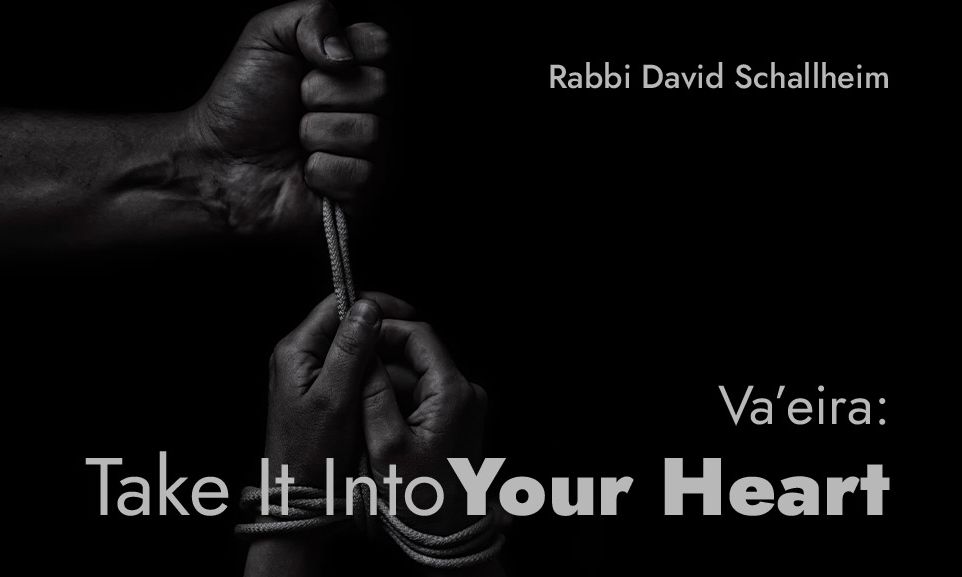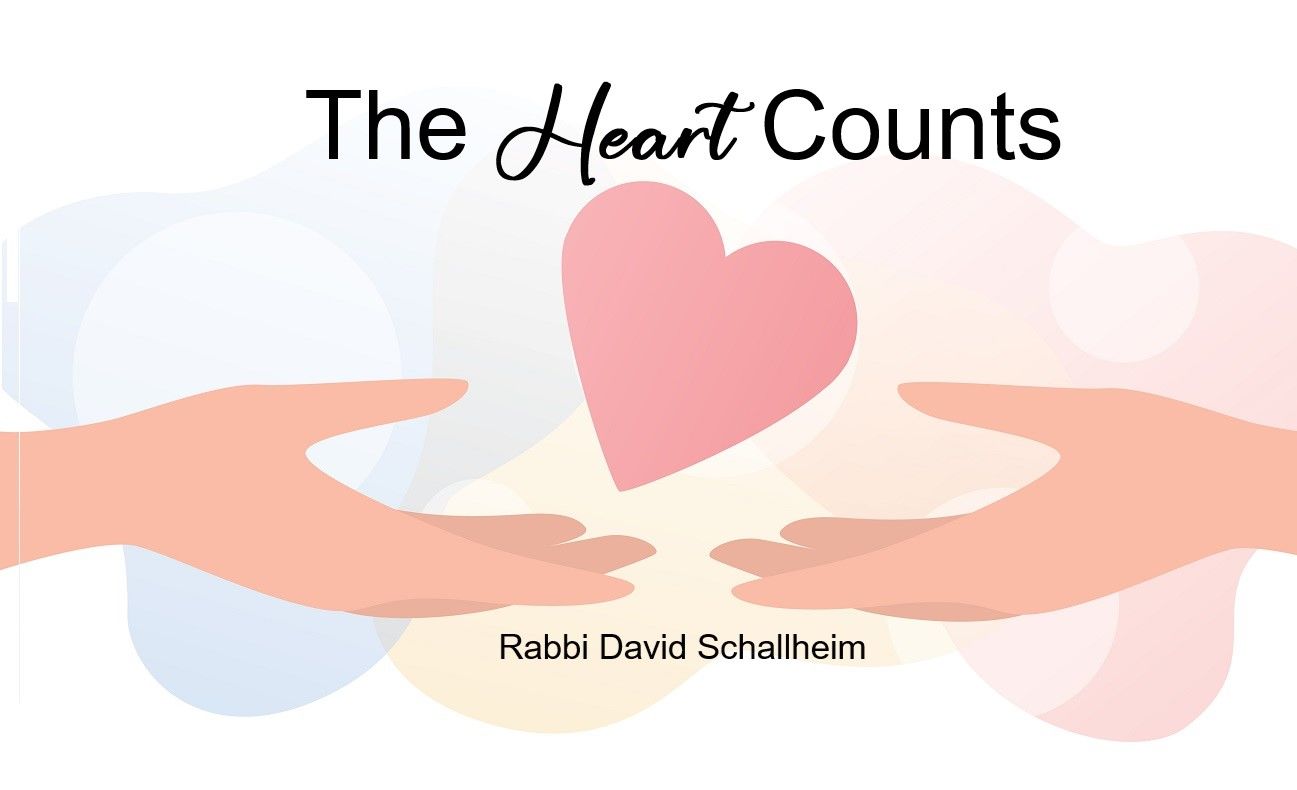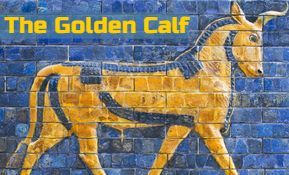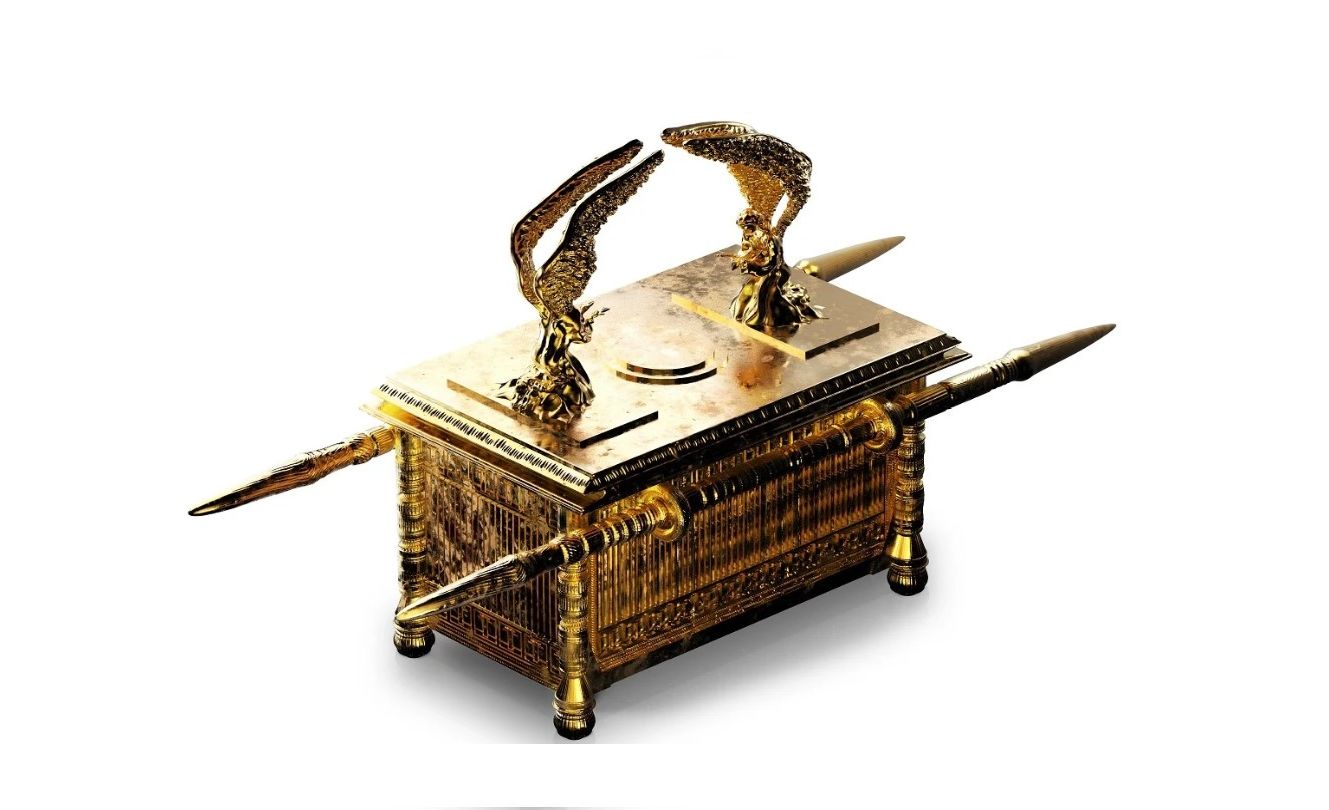
Va’eira: Take It Into Your Heart
We all want to live with what we know is true. But when push comes to shove, our behavior is often shaped by our emotions.

Shortness of Breath
“So Moshe (Moses) spoke accordingly to the Children of Israel; but they did not heed Moshe, because of shortness of breath and hard work” (Shemot/Exodus 6:9).
Moshe assured the Children of Israel that despite the poor start – for his arrival in Egypt was followed by an immediate intensification of the slavery – God’s salvation was on the way. “But they did not heed Moshe” – the Jews did not respond favorably to Moshe’s new assurance. It appears that their negative attitude was not due to a lack of faith, but to tremendous physical and emotional stress.
“God spoke to Moshe saying, ‘Come speak to Pharaoh, king of Egypt, that he send the Children of Israel from his land.’ Moshe spoke before God saying, ‘Behold, the Children of Israel have not listened to me, so how will Pharaoh listen to me? And I have sealed lips!’” (Ibid. 10-12).
Moshe assumed that the Jews had lost confidence in him after his negotiations with Pharaoh resulted in a worsening of their plight. He was positive that it would be foolhardy to attempt to persuade the mighty Pharaoh, who did whatever he pleased with his Jewish slaves and had absolutely no motivation to take Moshe seriously (Seforno).
Kal V’Chomer
The Midrash comments that this is one of the ten “kal v’chomers” in the Torah. Literally, a kal v’chomer means, “from the light to the strict.” It refers to a conclusion deduced from a lenient case to a strict one. Moshe’s comment to God wasn’t based on intuition or on a feeling that Pharaoh wouldn’t listen. It was based on the firm logic of kal v’chomer – if the Children of Israel (the lighter case) won’t listen to me, then Pharaoh (the heavy case) certainly won’t! (Bereishit Raba 92:7).
Rabbi Eliyahu Lopian questions this Midrash. Since the Torah states that the Children of Israel were unable to heed Moshe because of their “shortness of breath and hard work,” how could Moshe infer a kal v’chomer from this? How could he assume that Pharaoh wouldn’t heed him? Since the impediments of “shortness of breath and hard work” were not applicable to the king of Egypt, how could he deduce from the fact that the Children of Israel were not willing to listen to him that Pharaoh would also not be willing to listen to him?
What was this “shortness of breath”? Rabbi Lopian explains that they had had fallen from their high level of emunah – faith – into the depths of despair.
What high level of emunah did they previously have? The Torah testifies that when Moshe first returned from Midian, via the ‘burning bush,’ the Jews in Egypt had attained a high level of emunah:
“And Moshe told Aharon (Aaron) all the words of God with which he had sent him and all the signs that He had commanded him. So Moshe and Aharon went, and they assembled all the elders of the children of Israel. And Aharon spoke all the words that God had spoken to Moshe, and he performed the signs before the eyes of the people. And the people believed, and they heard that God had remembered the children of Israel, and they kneeled and prostrated themselves” (Shemot 4:29-31).
Intellectual verses Emotional Emunah
When Aharon told the Jews what God had said to his brother, Moshe, the people had emunah – they believed in God and they prostrated themselves. Rabbi Lopian, however, explains that this emunah was intellectual. It did not penetrate their hearts and senses. Belief that is in the senses – emunah chushit – is connected to our emotional-feeling world, which is the heart. On the other hand, an intellectual belief – emunah sechlit – is based on knowledge and perspectives, which is the intellect. The intellect is spiritual, detached from materialistic sensations – who has ever seen or measured a thought? Emotion, however, is felt and experienced by the body.
Even animals have a nefesh – a biological soul – which experiences emotion, but they don’t have a neshama – the seat of the intellect. Therefore, as every pet owner knows, they have feelings. But they are unable to use their intellect to influence their emotions. Only man can realize an intellectual truth, such as the existence of God, and bring the intellectual understanding into the emotional realm. We can –and must – bring our intellectual understanding of God into our emotional reality. In doing so, we will experience serenity and peace of mind.
These two aspects – the intellectual and the emotional – must be united, as the verse says (Devarim/Deuteronomy 4): “And you shall know this day and take it into your heart, that Hashem He is God in heaven above, and upon the earth below; there is none else.”
Rabbi Yitzchak Blazer was wont to say that just as there is a vast difference between someone who knows the truth and someone who doesn’t know it at all –there is also a vast difference, and perhaps an even greater difference, between a person who has achieved “and you shall know this day,” intellectual knowledge of the truth, and one who has reached the level of “and take it into your heart,” emotional attachment to the truth.
This is the achievement of emunah chushit – a level of faith that penetrates our emotion and that we can literally feel with our senses. When a man achieves emunah chushit, nothing can weaken his emunah. An emunah that is based solely on an intellectual understanding of the truth, however, can be easily destroyed. Without emuna, it’s easy to fall into the pit of despair when facing an emotional or physical challenge.
This is what happened to the Children of Israel. In the beginning they believed and prostrated themselves, but as Pharaoh intensified the decrees against them, they fell into despair and refused to heed Moshe. They had “shortness of breath” – a loss of the neshama (the breath of life) – i.e., they lost their intellectual appreciation of emunah.
Once we understand that the Jews had lost their intellectual appreciation of emuna, we can understand the kal v’chomer – Moshe’s inference from the case of the Children of Israel to Pharaoh. The Jewish people, who the Torah testified had reached a high level of emunah, lost that emuna when their intellectual convictions were confronted by the intensification of their slavery. Without emuna, they succumbed to despair. They had believed that the redemption was at hand; they believed in God and in his messenger Moshe; but then they were suddenly confronted with the opposite of what they expected. Instead of freedom, they were enslaved even more cruelly than before, to the point where it became unbearable. This fragile emunah, based solely on an intellectual understanding of the truth, collapsed in face of misery.
If the Jews who had attained emuna refused to listen to Moshe, then how would the wicked Pharaoh react? Moshe claimed that Pharaoh, who never knew a day of spiritual conviction and had never reached even the lowliest level of emunah, would certainly never listen to him. This was the kal v’chomer.
Then Pharaoh suffered plague after plague. After the plague of hail, he declared, “I have sinned this time. God is the righteous One, and I and my people are the guilty ones” (Shemot 9:27). His earnest confession was only as deep as his lips and never penetrated his heart. Immediately after the hail and thunder ceased, he returned to his stubborn denial of God: “And Pharaoh saw that the rain, the hail, and the thunder had ceased; so he continued to sin, and he strengthened his heart, he and his servants” (Ibid. 34). This is the epitome of “shortness of breath!”
If we find that the Children of Israel, who had witnessed miracles, signs and wonders, were afflicted with shortness of breath, what can we say for ourselves? We have to be continuously on the guard to protect our achievements in emunah. Chassidut and mussar are important tools for bringing our intellectual understanding into our hearts.
We all want to live with what we know is true. But when push comes to shove, our behavior is often shaped by our emotions. The Torah teaches us the necessity of bringing the intellectual understanding of truth into our hearts, so that we will be able to respond to life’s vicissitudes with strong emunah, rather than with shortness of breath.










